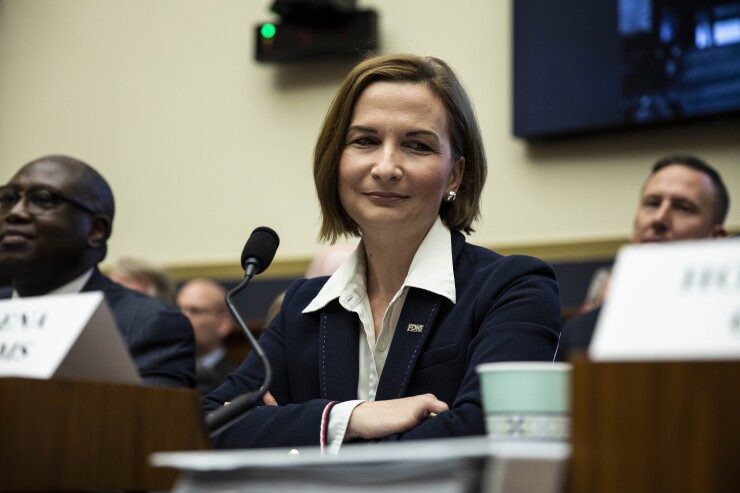WASHINGTON — Officials at the three federal bank regulatory agencies often say they want to work together on a joint plan to reform their Community Reinvestment Act procedures. But once again, a senior official has raised the possibility of agencies moving separately on CRA.
FDIC Chairman Jelena McWilliams said in remarks Wednesday that her "goal is to move together." But a scenario in which the agencies do not move forward at the same time is also on the table, she said.
"My hope again is to move together on the the proposal, but we’re willing to go as three agencies, two agencies, one agency, whatever the end outcome is," McWilliams said in a Q&A during a lunch event of the Exchequer Club, a Washington group that meets regularly to discuss banking policy.
Signs of disagreement over CRA have emerged before as the FDIC, Federal Reserve and Office of the Comptroller of the Currency have tried to craft a joint reform proposal. Comptroller Joseph Otting has tried to move aggressively on CRA reform, even suggesting that his agency

Without the participation of the Fed and FDIC, the OCC on its own sought public comment about CRA reform through the issuance last year of an advance notice of proposed rulemaking. That move was rare among federal regulators that usually work in lockstep. But officials expressed hope that they would come together in drafting an actual proposal.
McWilliams signaled that that hope is still there, but speaking to reporters after the speech, she said, "I have to leave the door open" to agencies acting on their own.
She noted the difference in the agencies' internal processes, with Otting being the sole leader of his agency while both the FDIC and Fed are governed by board.
“I can’t control what happens at the other agencies but know from years of rulemaking and dealing with rulemaking that it’s always better to have three agencies go together,” McWilliams said to reporters. “We’ll work until the last day, when we publish, for a compromise that all three agencies can move together on. But in the end I can't control the Federal Reserve’s votes, the [comptroller] can go by himself, I have votes."
McWilliams declined to blame the Fed for any slowdown in developing the proposal, yet did indicate differences between the FDIC and Fed's approaches.
“I wouldn’t say we’re slowed down by the Fed,” McWilliams said. "It's just our board votes as soon as a rule is in a good place, or finalized, or a proposal, and we just move it. But the Fed does their own thing. As you know, the Fed is always deliberative."
In a statement, a spokesperson for the Fed said the central bank "is continuing to work diligently to modernize the regulations implementing the Community Reinvestment Act with the aim of strengthening its provisions and creating greater consistency and predictability."
"As we move forward, we will continue to collaborate and work closely with our fellow regulatory agencies as well as engaging with banks and community stakeholders," the Fed spokesperson said. "Our goal remains to move forward together while ensuring CRA remains relevant for years to come.”
In the broad effort to reform the 1977 law, regulators are considering changes to banks' CRA assessment areas, streamlining metrics for what satisfies a bank's CRA obligations and other measures.
McWilliams would not specify when a CRA plan would be released. In the Q&A, she said a proposal by the end of October would be "ambitious."
“Let’s just go with ‘soon,’ ” she said.
McWilliams later told reporters that part of the delay in the negotiations between the three agencies has to do with the shortcomings of existing CRA data.
“If you really want to analyze the impact of CRA currently versus under any proposal that can come up, you have to recognize the limits of data,” she said, adding, “So as you come to a final rule or a proposal, you have to live with the inadequacy of the current data gap.”
When it has come to negotiating with the OCC and Fed, McWilliams said, “that’s where some of the tug of war has been.”





